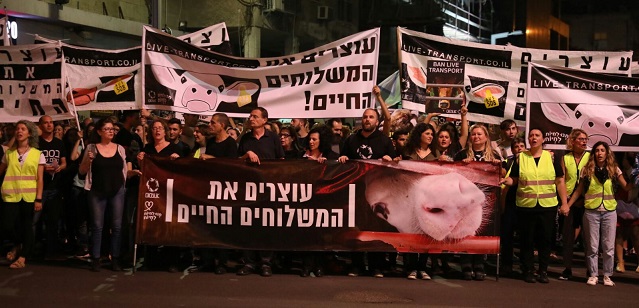[Updated] Poll: A Majority of Australians Reject Live Export
Around three in four Australians want to end live export, and more than nine in 10 want to see long-haul standards improved so all animals can lie down and access food and water easily. Those are among the findings of an independent poll commissioned by RSPCA Australia and conducted between April 16 and 20 among a representative sample of 1,500 Australians nationwide.
The findings come as the RSPCA renews its call for an immediate halving of the stocking density on all future live sheep shipments, an end to all exports into the Middle Eastern summer (May and October) and ultimately an end to the live sheep trade.
National concern has been widespread after whistle-blower footage aired on April 8 on the 60 Minutes program showed conditions on board the Panama-flagged Awassi Express last year when thousands of sheep died of heat stress on the way from Australia's winter to the Middle Eastern summer. Throughout the program, footage from five separate voyages was aired depicting thousands of sheep suffering severe heat stress; sheep caked in melted feces and urine; injured and sick animals left to die slowly; decomposed bodies left in pens with living sheep and ewes giving birth and their lambs dying.
WARNING: THIS FOOTAGE SHOWS GRAPHIC CONTENT THAT SOME VIEWERS MAY FIND DISTURBING
Politicians have voiced concern on seeing the footage: “I have been the first person to support this trade,” said Liberal MP Sussan Ley on ABC News. “I am actually no friend of the animal welfare movement - in the past they have taken me to court. I am a country person, and I have worked in rural industries and been a farmer for nearly half my life. If I am calling time on this trade, then it really is time.”
The poll found almost seven out of every 10 Australians in rural areas and country towns want to end live exports, and more people in rural and country towns than anywhere else (just under 95 percent) are concerned over the inadequacy of current welfare standards.
The poll data contrasts with some industry views that opposition to live export is centered in city areas and among keyboard warriors who substitute emotions for fact - with no direct experience of farming. The potential impacts of a live trade ban should be considered within the national economic context, says a blogger on the Australian Farm Institute website, Katie McRobert. “Activists tend to decry economics as a weak defense of poor behavior, but this is incredibly naïve... every social benefit we enjoy in our first-world community is directly related to our economic prosperity... what needs to change next is the regulatory environment, not public perception.”
She says that the overall trend is for improved outcomes on live export journeys and that livestock mortality rates are steadily declining. “Australia’s animal welfare standards for livestock set a benchmark far in advance of any other place on the planet.” Removing Australia from the live trade removes any incentive for the other 130 live-exporting nations to emulate these standards.
Last year, before the current controversy, one grazier who sold livestock for export spoke against an earlier, temporary ban, saying: “Does anybody find out where our coffee comes from and whether its grown by slave labor?” But, Dr. Jed Goodfellow, Senior Policy Officer at RSPCA Australia, says cruelty occurring in a different jurisdiction does not absolve the industry of their ethical and legal obligations.
The poll results suggest that his opinion has supporters. Opposition to live export was strongest in South Australia (four in five) and also strong in Western Australia (almost seven in 10). Most live export sheep are sourced from these two states. According to the poll, more than three in four Australians agree with the idea of the government providing financial support to farmers to stop the live export trade.
The whistle-blower described challenging conditions for livestock carrier crews, and on April 27, the Maritime Union of Australia joined the debate: “We congratulate the community for making such an impassioned stand on the barbaric practices and inhumane treatment of livestock destined for the overseas market. However, we ask that they also consider the treatment of seafarers working on these vessels which unfortunately is not much better.”
Nationally, tens of thousands of Australians continue to express their opinions through demonstrations, meetings, social media and petitions to government representatives.
Israel Rally
Around 3,000 people rallied in Tel-Aviv on Saturday, calling for an end to live animal imports from Australia. The rally was organized by local advocates following the 60 Minutes program, which has been broadcast in Israeli media too. Six Knesset members participated in the event: Sharren Haskel, Yael Cohen Paran, Tamar Zandberg, Nurit Koren, Mossi Raz and Dov Khenin.
The Israeli Prime Minister spoke out on the issue a week ago after his wife called Lucy Turnbull, the wife of Australia's Prime Minister Malcolm Turnbull, to express her concern. Now Israel's Minister of Agriculture, Uri Ariel, has announced that he has spoken with David Littleproud, his counterpart in Australia: “During my conversation with the Australian minister, I explained that we intend to reduce significantly the transport of livestock from Australia to Israel; this has always been our policy. I stated that I cannot interfere with a shipment outside Israel’s territorial waters, but we will interfere on animal welfare issues as soon as the shipments reach Israel’s territorial sea.
"We will not tolerate welfare violations, and we will continue to improve the welfare of animals. We will set stricter regulations for the transport of live cattle and will raise the import of meat in order to prevent such voyages.”
The Prime Minister’s son, Yair Netanyahu, has also spoken out. In a video provided to advocates in Israel he says: “I too support stopping the live transports and the horrible suffering they cause animals.”


that matters most
Get the latest maritime news delivered to your inbox daily.
Credit: Oren Ziv
